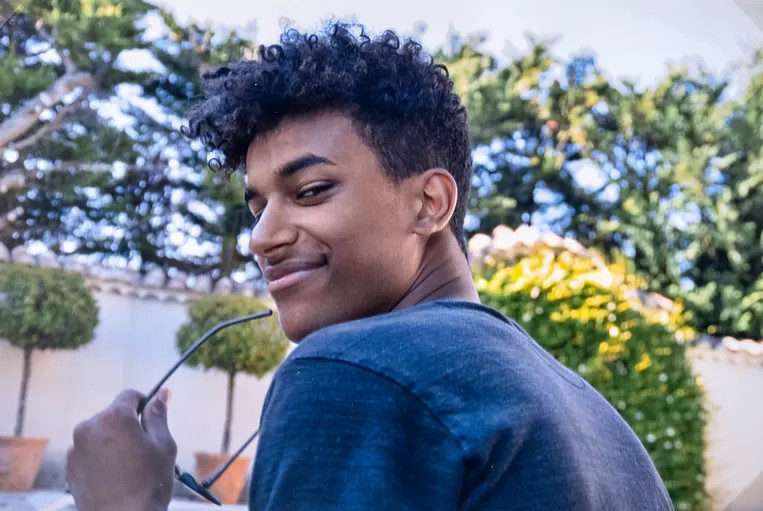
Sanda Dia was 20 years old when he died as a result of a brutal, dehumanising hazing to join the elite KU Leuven fraternity Reuzegom in December 2018 (Photo courtesy of Sanda Dia’s friends)
By Annette Ekin
Published On 12 Jan 2021
Al Jazeera
Two years after Sanda Dia died, his family await justice and answers, while revelations point to racism and a wider system of elitism that failed him.
Brussels, Belgium
On the morning of Tuesday, December 4, 2018, 20-year-old Sanda Dia was dressed in a white robe, selling roses on a cobbled street in the historic centre of Leuven, a quaint student city that is home to Belgium’s largest and oldest university, looming Gothic architecture and lively squares. A photograph shows the Black third-year civil engineering student smiling widely, standing alongside a potential customer.
Along with two other students, Sanda had begun the first task of a scripted two-day initiation ritual or “baptism” to join a student fraternity at the prestigious research university, KU Leuven.
His oldest childhood friend, Ferre Vervoort, saw the photos of Sanda selling roses on social media. “I was just hoping he would have fun. In the pictures, it looked like he was laughing and having fun,” he says. “But I didn’t see any pictures of the second day when he went to dig his hole.”
It was the start of a brutal and dehumanising hazing to join Reuzegom, an elite, mostly white – Sanda would have been its second non-white member – fraternity for students from the port city of Antwerp. It cost Sanda his life.
The hazing
Initially, few details about the hazing were publicly known. Sanda’s death was depicted as an accident, the result of a hazing that got out of hand. Reuzegom’s rituals were known for their secrecy, and for being extreme. But over the summer of 2020, the country’s Dutch-language news outlets started to publish details from police investigations, revealing racism and elitism within the all-male fraternity, which had 22 members at the time, and reconstructing the brutal last 30 hours of Sanda’s life.
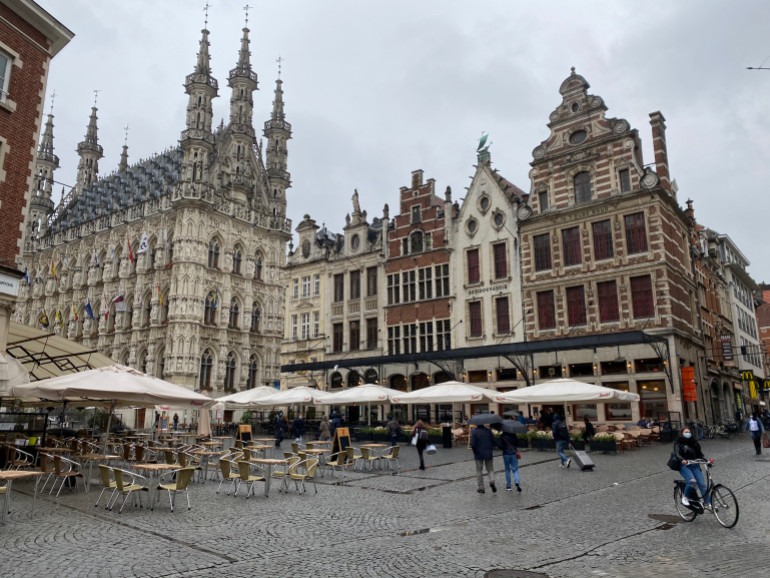
The first day of the hazing of Sanda Dia and two other Reuzegom pledges took place in the centre of Belgian student city Leuven [Annette Ekin/Al Jazeera]
On day one, the three pledges were forced to drink excessive amounts of alcohol. They were urinated on. After passing out, they were taken to Sanda’s room in shared student housing where the taps were sealed so they could not drink water and their hair was cut.
The next morning, Sanda could not walk on his own. The fraternity members took the pledges about an hour’s drive to a log cabin used by scouts in a forest. There, they each had to each dig a ditch and sit half-naked for hours in ice-cold water, periodically dumped on them in bucketfuls. Members of the fraternity – 18 were involved in the hazing – urinated on and insulted them.
The three students were made to drink a blended mix containing pet food and fish oil. At one point, an eel was released for Sanda to try to bite its head off. At nightfall, car lights were trained on a target that the cold men had to crawl to. There, they had to swallow goldfish and vomit them back up with fish oil. When Sanda could not bring his goldfish up he had to drink more fish oil. Then they had to bite the heads off mice.
Back in the ditch, Sanda’s condition deteriorated – he was no longer responding or coherent. After a bombardment of ice water, Sanda remained in his pit the longest, only leaving it when the other pledges dragged him out at about 7pm.
He laid on the ground, curled up in the foetal position, where he began to make strange sounds and lost consciousness.
Then, at around 9pm, club members eventually drove him to the hospital, 13km (roughly a 15-minute drive) away. He was bleeding from the nose and mouth. The salt content in his body was excessively high and his body temperature was 27.2 degrees Celsius – he was in a state of severe hypothermia, and went into a coma.
While Sanda was taken to the hospital, the other two pledges were made to get back into their pits and to drink more fish oil. But when news of Sanda’s condition reached the members back at the forest, the remainder of the hazing or “baptism” was cancelled. They had been due to complete it by lying naked in the forest for two hours. Instead, at 10:39pm, the other two pledges were also hospitalised. One of them would stay in hospital for a day; the other for two.
Sanda, however, died of multiple organ failure two days after he was admitted.
Racist songs and slurs
A deleted WhatsApp group and photos and videos recovered by investigators over the weekend after Sanda’s death reveal that Reuzegom members cleaned the cabin site and Sanda’s room while he lay in hospital.
Other elements have also emerged. Two months before he died, Reuzegom members gave Sanda, who became a pledge that September, orders to clean a trashed party venue using a racial slur. The fraternity had officially disbanded within days of Sanda’s death, but a video made about a month later has former members singing a racist song promoted by the alt-right to a Black homeless man.
These revelations sparked outrage among students and the wider public. For those closest to Sanda – they have made his loss even harder to bear.
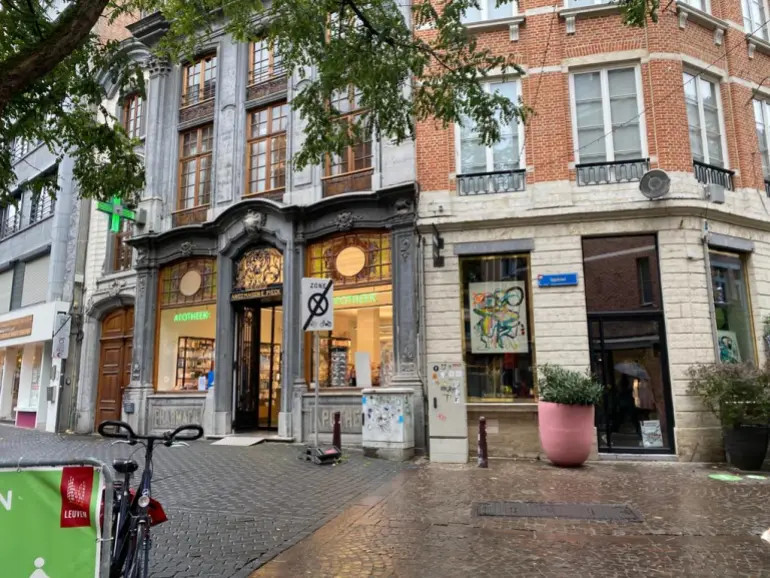
The Belgian city of Leuven, home to the country’s top-ranked university, KU Leuven, is where Sanda Dia studied civil engineering and in his third year became a Reuzegom schacht or pledge [Annette Ekin/Al Jazeera]
Eighteen members of Reuzegom are under investigation and a decision, delayed since September, is pending on whether to try them in a criminal court for unintentional manslaughter, administering harmful substances, degrading treatment and refusal of assistance due to culpable neglect. They risk up to 10 years in jail if tried and convicted.
Many unanswered questions still surround the death of Sanda Dia. But his story has shined a harsh light on how racism operates in Belgium and demands a closer look at what – in society and at the university – may have enabled this tragedy to happen in the first place.
‘My soulmate’
The mixed-race son of a Mauritian-born immigrant from Senegal and a Belgian woman, Sanda grew up in Edegem, a well-to-do suburb of southern Antwerp.
Ferre met Sanda when they were in kindergarten and the two quickly became friends, living about a five-minute bike ride away for much of their adolescence.
“He was my best friend. A little bit my soulmate,” says the gentle-spoken 22-year-old, speaking over a video call from Antwerp where he studies industrial engineering.
As teenagers, the two hatched various plans. They sketched out a video game with a cave-dwelling protagonist, and shared a love for anime and Japanese culture and talked about one day living in Tokyo. Sanda was friendly, kind, funny and enjoyed ribbing his friends. Ambitious and smart, he was a natural at whatever he did, whether it was maths or football, according to Ferre.
His future was bright. It was only in the third year of his five-year degree (three for his bachelors and two for his masters) at KU Leuven, the top-ranked university in Belgium, that he became a Reuzegom schacht, or pledge. First year students often join societies to make friends, but Sanda already had his close friends.
Ferre and others say Sanda wanted to join Reuzegom to access the connections and networks that the fraternity, set up in 1946 for men from an Antwerp school, represented. It would open doors.
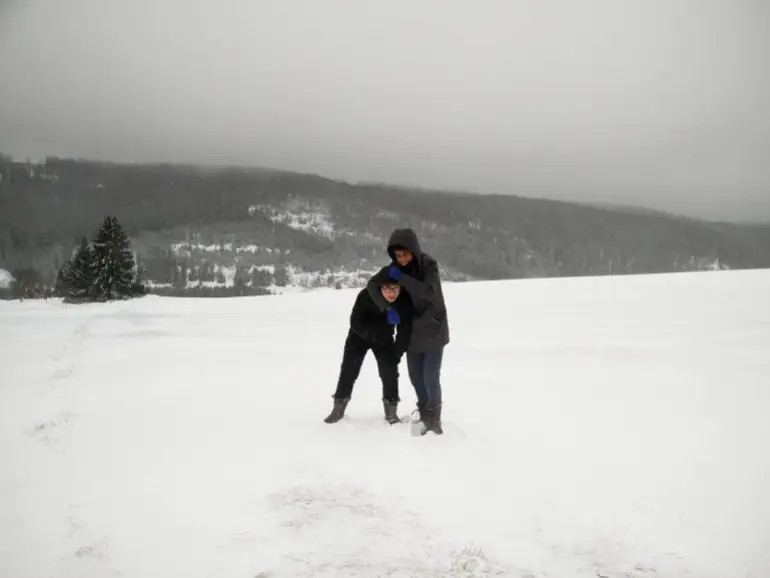
“I just hope that there would be justice,” says Ferre Vervoort, Sanda’s oldest childhood friend [Photo courtesy of Ferre Vervoort]
His parents were no longer together when he died. His father Ousmane Dia still calls him “mon meilleur ami”, “my best friend”, one of his lawyers has said (his parents are represented by different teams of lawyers who are cooperating). Ousmane worked in a truck manufacturing factory while raising his son and to help with his studies, and has said Sanda knew studying was a “huge privilege”.
Ferre was surprised by his friend’s decision to join Reuzegom. He did not think he needed the club, but he understood why he wanted to join. All their lives, he says, Sanda wanted to go far in life and be successful.
The last time he saw Sanda, his textbook was open on a page on fusion rockets, he recalls.
The two friends always picked up from where they left off after Sanda went to study in Leuven. They would see each other about once a month but messaged every day on Facebook messenger. But they did not speak much about Reuzegom. Sanda knew Ferre did not like the culture of belittling newcomers in student societies. Still, Ferre knew his friend was excited about joining – and nervous about the hazing.
‘Confident that everything would be all right’
Robrecht Cleiren, 22, a biosciences master’s student at KU Leuven was part of Sanda’s close group of friends from secondary school. The two could talk and laugh about everything, and he admired Sanda’s outlook – “being 100 percent confident that everything would be all right.”
Sanda worked hard to create opportunities for himself and make his dad proud, says Robrecht. “He knew his dad did everything for him to give him a better future, and he promised to live up to that,” he says.
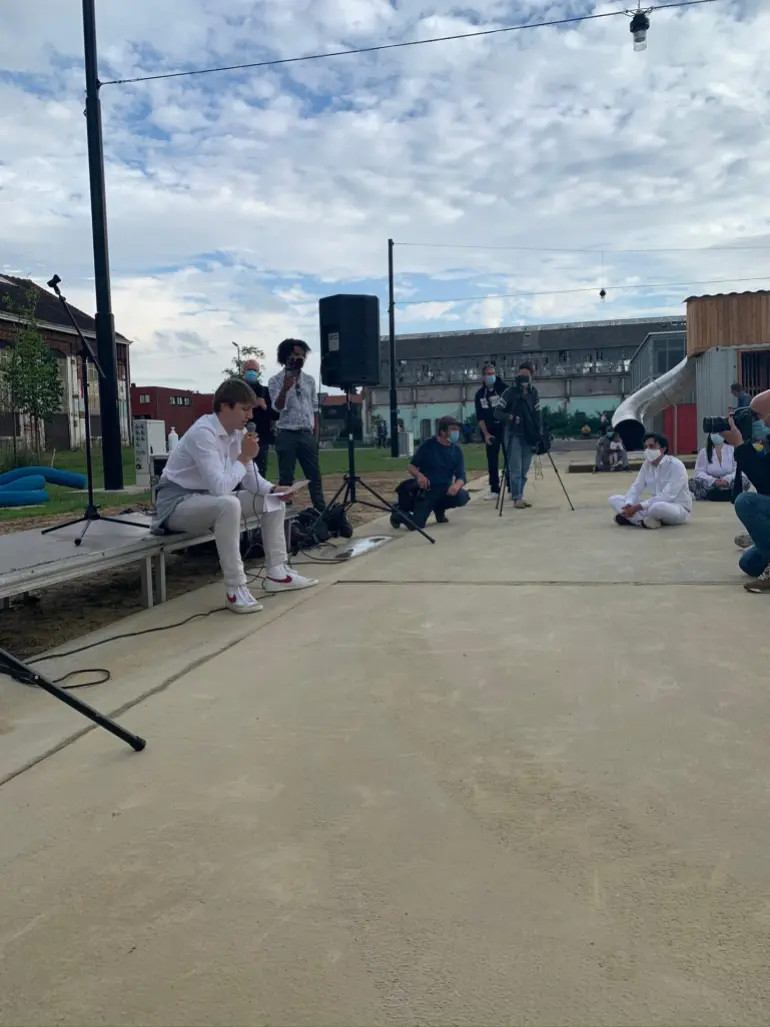
Robrecht Cleiren, a good friend of Sanda Dia, speaks at a silent vigil for Sanda held in Leuven in early September last year [Justine De Smet/UNDIVIDED]
Growing up, Sanda was one of the only Black people at their school and was popular with teachers and pupils. But Robrecht thinks Sanda knew he would get it harder in life because of his skin colour. At some level, he thinks Sanda wanted to prove that skin colour did not matter.
They played together at the same football club in Edegem which is where Sanda met members of Reuzegom, including its only non-white member.
Robrecht understands why he wanted to join. Just as Sanda was drawn to Japanese culture, he wanted to explore and have new experiences, he says.
When Sanda told him about Reuzegom, the question at the time was “why not?” He could always quit, thought Robrecht, and if he liked it, he would make connections and try something new.
Sanda saw how Robrecht and another friend had joined a student society in Antwerp and enjoyed it.
But in the lead up to the hazing, Sanda began to have doubts, says Robrecht. Reuzegom members were not his kind of people and the initiation would be hard. He was nervous, not knowing what to expect. Part of the hazing is just that – drumming up fear. “To test their mental strength,” says Robrecht.
The Sunday before the initiation, Sanda did not show up to play in a football match. Robrecht called him to ask where he was and Sanda told him he felt ill and wanted to spare his strength for the hazing. That was the last time they spoke on the phone. It could not be that big a deal. “You’re kidding right?” Robrecht remembers saying to him.
“None of us knew what was coming.”
Reuzegom’s excesses
On a Friday afternoon in Leuven in late September last year it is dark and rainy. Every so often a student’s weekend suitcase clatters loudly over the cobblestones. Halloween paraphernalia sits on display in a discount homewares chain store in the city centre. A short stroll away, is the shuttered rustic pub that Reuzegom frequented. Stencilled on its white walls in red is, “Justice for Sanda”.
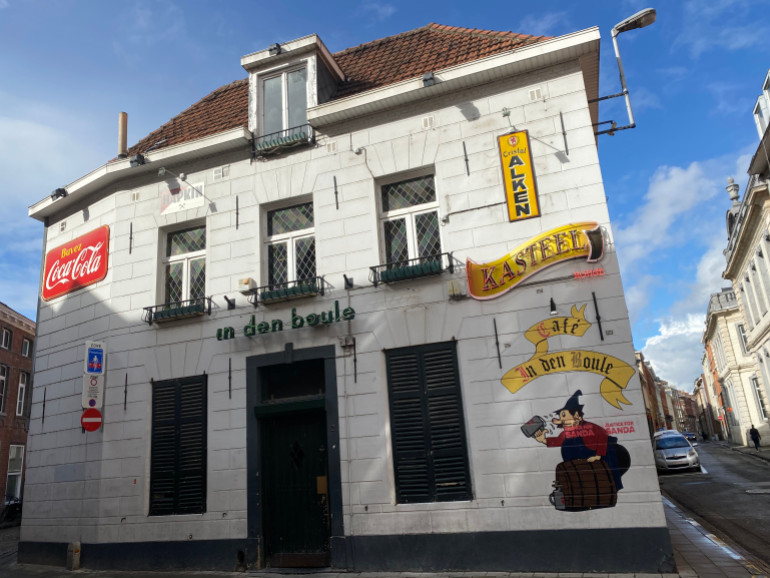
A pub frequented by Reuzegom had the words “Justice for Sanda” stencilled on the walls in September 2020 [Annette Ekin/Al Jazeera]
The school year had begun a few days before. A fresh round of initiations would soon start. Many of the students in Leuven come from the eastern part of Flanders, Belgium’s wealthier Dutch-speaking north, while the country’s French-speaking region lies to the south. About one-sixth of the university’s nearly 60,000 students come from abroad.
Kenny Van Minsel lived a stone’s throw away from that pub when he was president of LOKO, the umbrella association for about 140 official student societies. Known as “circles”, official associations are based on faculties such as economics or law, interests or political leanings, and receive subsidies from the university.
In 2018, he had tried twice to get the clubs, the 28 or so unofficial regional sororities and fraternities, including Reuzegom, to sign a hazing code of conduct, known as the baptism charter, which is adhered to by official circles. They acted as a bloc against it.
Initiations are considered a rite of passage at Belgian universities and even with unpleasant activities like getting egg in your hair or flour being thrown on you, they are supposed to be harmless fun. It is a way of getting to know fellow first years in a playful environment, says Van Minsel. “It has a place.”
Although, as the charter points out, it should be voluntary. Van Minsel, for example, never did an initiation for Historia, the history student union that he joined. But he would witness Reuzegom and other clubs’ antics while living near their watering hole. Bikes were stomped on, mailboxes urinated in and alcohol downed through snorkels. Those who had passed out were moved into a safety position so they would not choke on their own vomit. Pledges had people “responsible” for them who would tell them what to drink and when.
A key activity for societies is the cantus, singing and drinking at a table.
During a Reuzegom cantus, two months before Sanda died, the club racked up thousands of euros worth of damage at a hired student venue. When a LOKO staff member told them to clean up, Reuzegom members called out to Sanda using a racial slur and ordered him to do it. The employee asked why they were speaking this way and the reply, says Van Minsel, was: “Black people have to work for white people.” Sanda apparently shrugged off their behaviour when asked by the employee why he let them speak that way.
When the case details came out last summer, Van Minsel was disturbed to see people on social media minimise the fact that Sanda was not white, so he shared the incident on Twitter.
It is for the courts to decide whether racism was a motive in Sanda’s death, he says, adding that he believes “it was clearly a factor”.
Reuzegom’s main reputation was as an elitist club with no sense of responsibility, says Van Minsel. “In general [the] thing you always heard was that Reuzegom had the most extreme hazings of the clubs,” he adds. Putting people in pits of cold water was their trademark.
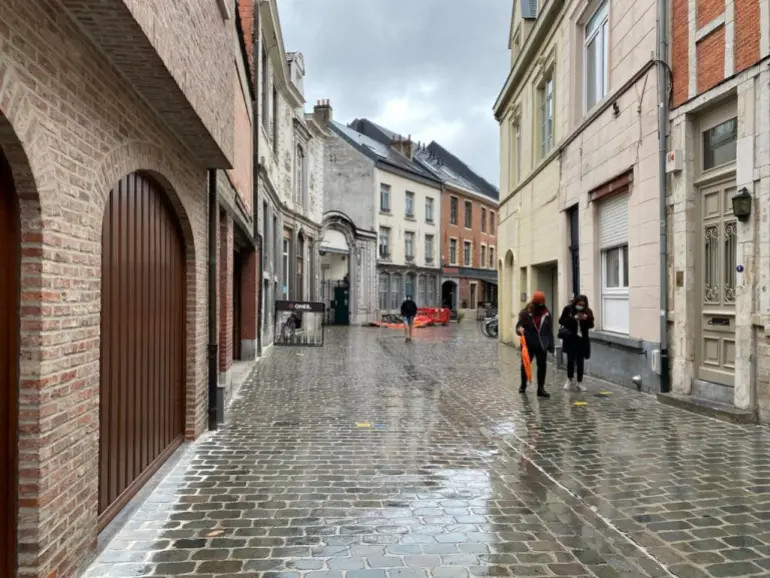
Shortly after the school year begins in September, students at KU Leuven will often undertake initiations to join student associations [Annette Ekin/Al Jazeera]
Reuzegom was notorious for its hazings as there had been trouble in the past with animal cruelty. In 2013, pledges were expected to look after a rabbit for an academic year and then kill and eat it. The same year, an animal rights organisation took former members to court for abusing and killing a piglet in 2009. They paid 400 euros each ($486) to avoid prosecution.
When Van Minsel heard about Sanda’s death, he was in disbelief and angry, and within a week he met with club representatives and tried again to get the clubs to sign the baptism charter. They were shocked by what had happened, Van Minsel says, but refused to give up their independence. Later, he and other LOKO members were intimidated and harassed with homophobic posters put up around the campus and threats and cyberbullying, and volunteers were pushed on the streets. Their office was vandalised. He says his complaints to the university were never taken seriously.
Without a cultural shift within the clubs, “I’m very much worried that things will normalise and repeat themselves in years to come,” he says.
The clean-up
On December 5, after Sanda was taken to the hospital, Reuzegom members cleaned all traces of the hazing. When the chief investigator arrived at the cabin in the early hours of the morning, he noted: “Everything [is] clean.” All online information about the members had been taken offline, from LinkedIn, Facebook and other platforms.
Based on the investigation, Sven Mary, a well-known lawyer representing Sanda’s father and brother, told Belgian magazine Knack it is apparent that the statements between the suspects’ “first and second interrogation were thoroughly adjusted and apparently aligned”.
Looking into former members is something investigators have tried to do, particularly as Mary says a member called “Uno” changed the ritual into something “insane” about a decade ago. “It is easier to get a list of secret agents at the Stasi than a list of members of Reuzegom. This is the Flemish elite, and they close ranks,” he told De Morgen newspaper.
The 18 suspects, most of whom were around the age of 20 in 2018, are the sons of people who belong to a legal and corporate Antwerp elite. The families have hired some of the country’s most high-profile lawyers. The mother of one suspect is a judge in Antwerp, so the investigation had to be moved from Antwerp at some point. One suspect studied medicine.
“They were preparing to become leaders of our society in different areas and fields,” says Jan Fermon, a lawyer on the team representing Sanda’s mother.
“We see a very strong elitist position in this group, which we think has contributed very strongly to what finally happened.”
It is an elitism that Fermon says can, in an initiation, start with disrespectful jokes and devolve into something violent. “From a lack of respect, you gradually slide to humiliation, from humiliation, you slide gradually to violence, and from violence, you can gradually slide to the worst kinds of violence … And I think that’s actually what happened.”
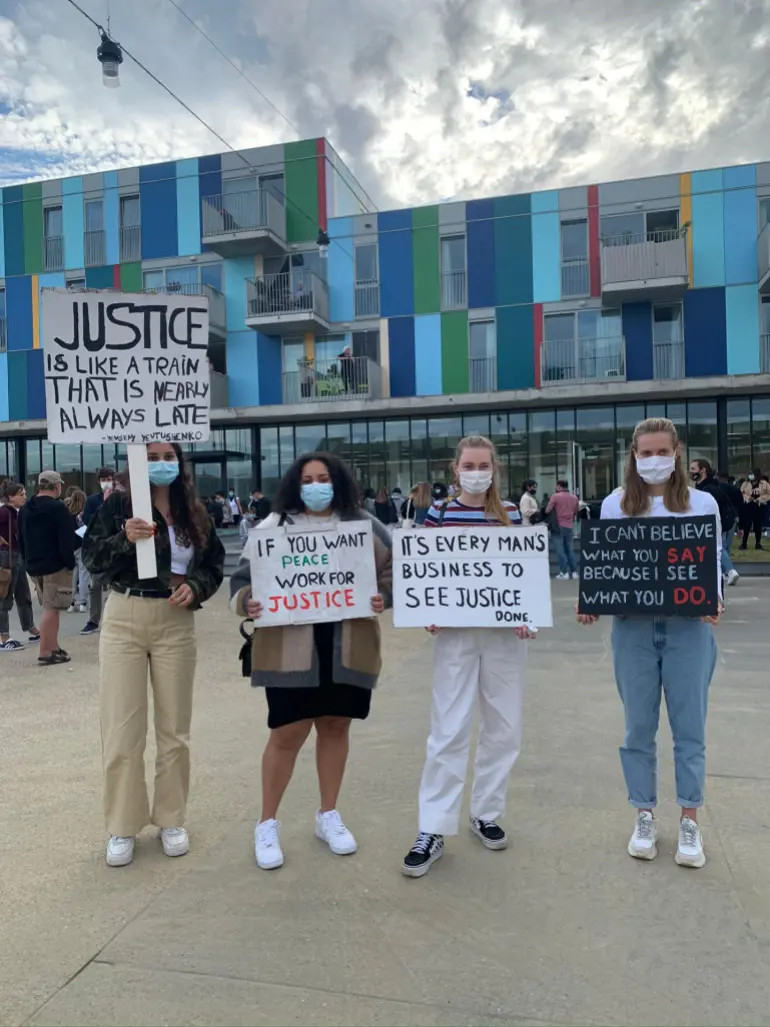
Some students believe the death of Sanda Dia has woken up fellow students to real issues on campus such as racism, but not the university, KU Leuven [Justine De Smet/UNDIVIDED]
Lieve Pepermans, a lawyer working on the team with Fermon, refers to public concerns that the suspects will not be punished. “It’s impossible [that they won’t be punished],” she says. “These are very serious accusations.”
At this point in time, their team does not believe that racism led directly to the events. “For that, we don’t find proof in the file,” Pepermans says. She also points out that there was another non-white member.
They see racism, however, in the context of Reuzegom’s elitism and a mentality of being “above society”. “It’s like minachting (contempt) for others, for the laws, minachting for animals,” says Pepermans.
Until July 2020, a member dressed in a Ku Klux Klan outfit appeared in a 2007 Facebook photo. Investigators found a text referring to “our good German friend Adolf”, by Alexander G, nicknamed Janker, convincing members to elect him “tamer” for 2018, the name given to the person who leads the hazing. He said he wanted to make it “a crazy brutal year for the elite that we are.”
A video dating back to about a month after Sanda’s death was found on a suspect’s phone. In it, Reuzegom members approach a Black man panhandling in Leuven. They go to take his hat, and the man moves away. They are singing: “Cutting off the hands, the Congo is ours”, a reference to the mutilation carried out by soldiers during the brutal and exploitative colonial regime of King Leopold II.
The rising far right
Some situate this song within the move in Flanders, Belgium’s Dutch-speaking northern region – where many say racial slurs and racism are not uncommon – further right, with ideas from the far right slipping into the mainstream.
Schild & Vrienden (Shield & Friends), a far-right Flemish identitarian youth movement, promoted the song through online meme pages, says Ico Maly, an associate professor in digital media and politics at Tilburg University in the Netherlands.
These Flemish alt-right memes are deeply disturbing in the way they twist far-right messaging with humour.
In October 2018, white people chanted that song at a group of four – two Black women, a Black man and an Asian girl – throughout the day at Pukkelpop, a music festival in the eastern Flemish city of Hasselt.
The founder of Shield & Friends defended it as an “edgy student song” sung “almost everywhere”.
In the past several years, the Flemish nationalist far right has been on the rise. In 2019, far-right Vlaams Belang (Flemish Interest) surged ahead to become the second-biggest party in Belgium after the New Flemish Alliance (N-VA) in part by targeting young men aged 18 to 34.
Both parties espouse Flemish nationalism. N-VA’s discourse says immigrants are welcome so long as they assimilate, while Flemish Interest pushes ethno-cultural homogeneity, according to Maly. At a Flemish Interest protest in September, some supporters’ cars had neo-Nazi symbols on them.
Their success has shifted debates further right and positions such as separatism, assimilation and protectiveness over the Flemish language and culture are widely shared in society, according to Maly. Racist, anti-migration policies of the far right considered too radical in the 1990s are now the norm such as the detention of migrant children, he says.
“That is what we see happening,” he explains. “So it’s a continuous process of the normalisation of the extreme right.”
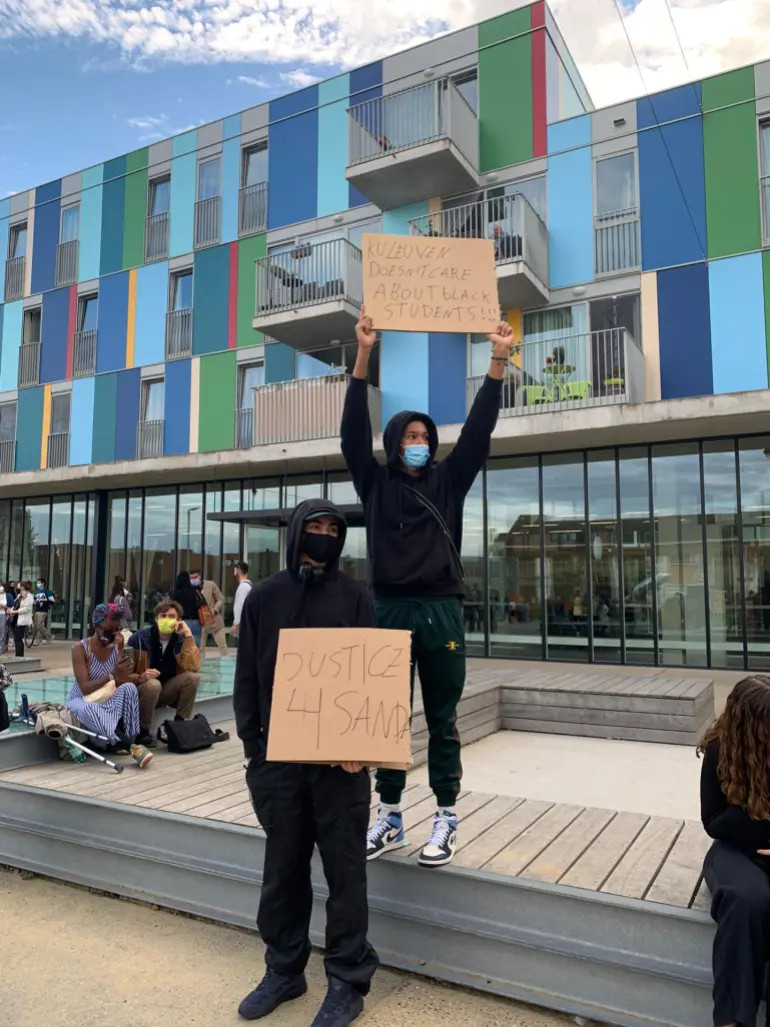
On September 4, 2020, a vigil was held for Sanda Dia in Leuven organised by his friends, Karibu and UNDIVIDED. Many students of colour have felt despair at the university’s motives [Justine De Smet/UNDIVIDED]
The move towards the far right is also happening on campuses, although to a lesser extent, says Sander Claessens, 24, an anthropology student and president of the KU Leuven chapter of the student union of the Workers’ Party, a Marxist party. Male students in particular are becoming more right-wing. He says it is important to see Reuzegom within the wider context of ideological trends among other similarly white, sexist, elitist student associations.
Traditionally, student associations were designed to produce a Flemish national elite and networks when, in the 1930s and after WWII, the elite was generally French-speaking, according to Maly.
“They form a consistent structure that prepares somebody to become a member of a political party, or at least a member of a certain elite in society,” he says. “What is new, I think, is that you see a radicalisation of those structures.”
KVHV, one of the country’s oldest societies, and another circle, the Nationalist Student Association (NSV), both official associations, have alumni who have gone on to become mainstream right-wing and far right politicians, says Maly.
NSV is typically far right, but Maly says KVHV views are also becoming more extreme when it comes to issues such as equality of the sexes and migrants, for example. In 2018, KVHV president and a Shield & Friends activist wrote in KU Leuven’s student newspaper about how – now known as – the Democratic Republic of the Congo (DRC) was better off as a colony and about the benefits of colonisation.
Referring to this op-ed, Claessens says ideas being spread among certain students are becoming more extreme and are being intellectually argued. “It’s not just like the boys will be boys who do stupid stuff when they are young,” he says.
In Maly’s opinion, the changes happening on campus will have an effect in the long term. “We should see such unions as learning environments in which people are socialised. They produce intellectual activity, but the intellectual activity is now directed towards conservative revolutionary ideas.”
Being Black in Belgium
The Black Lives Matter protests that swept across the world after the police killing of George Floyd in the US last June also came to Belgium, energising anti-racism movements, igniting a growing call for Belgium to confront its brutal colonial past in the DRC and prompting the removal of statues of Leopold II whose rule killed millions of Congolese.
But when it comes to issues of systemic racism, the country has yet to see real change, says Mohamed Barrie, 28, a social worker and organiser of Black History Month. He is originally from Sierra Leone and came to Belgium when he was about 12.
Sanda’s death is tragic on many levels, he says.
When he died, mainstream news outlets glossed over any discussion that Sanda being Black was relevant, says Barrie. “We have this thing in Belgium where people are very afraid of grasping the idea that … someone’s skin colour plays a role in the way the world around him or her or they is perceived, and how that impacts their life and life chances. So what you usually have is this erosion of your race.”
When asked how racism may have been a factor in Sanda’s death, he says: “It’s not a one on one equation.” One element at play, he thinks, was that Sanda likely knew that as a Black person from a family that was not wealthy, he might struggle to get the kind of jobs he wanted.
“He needed a gateway and that gateway was this very racist white student union,” Barrie says.
“It’s that element of race and socioeconomic status – you’re forced to take certain steps in society even though you know it’s going to be of a lesser, well, not pleasant road to take … And that means going through microaggressions like verbal racism and just being humiliated.”
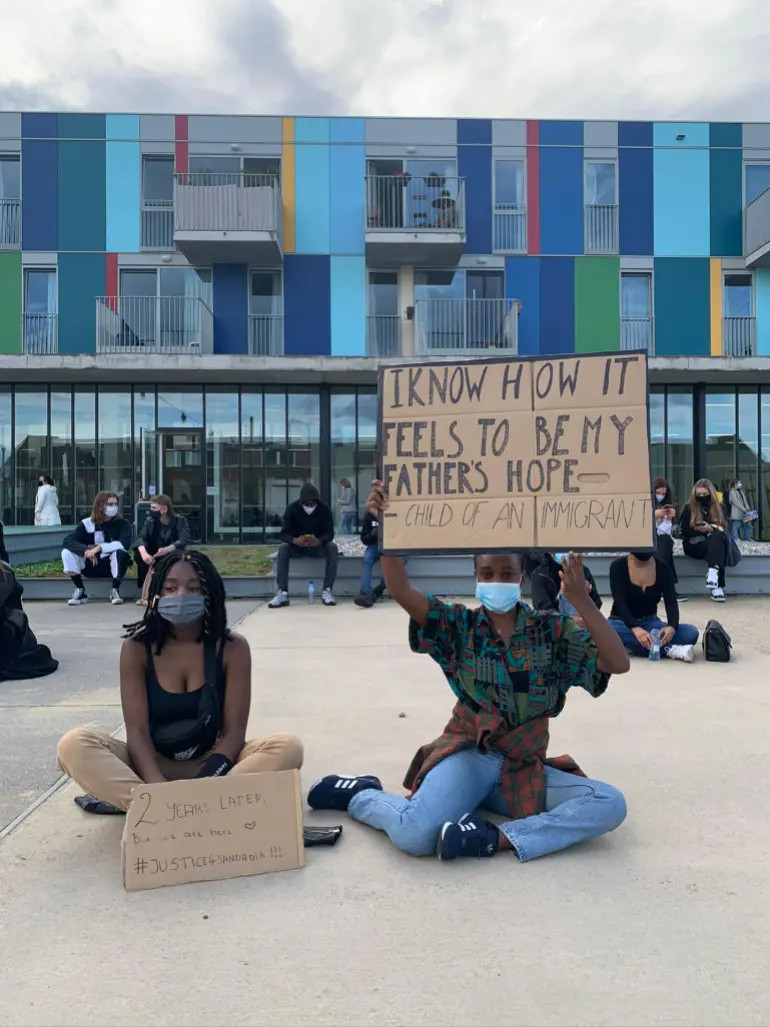
Sanda Dia’s father Ousmane, a Mauritian-born immigrant from Senegal, told Belgian news outlet De Morgen that his son knew studying was a “huge privilege” [Justine De Smet/UNDIVIDED]
For him, Sanda’s story highlights the daily, invisible struggle for people of colour in Belgium – the structural racism which affects job opportunities, access to housing and schooling.
Research by the King Baudouin Foundation shows that Belgians of Congolese, Burundian and Rwandan descent face unemployment rates that are four times the national average, despite 60 percent of Afro-descendants having a degree. These groups are also ethnically stratified into certain jobs, with often very highly educated women working in jobs lower than their qualifications, such as in the domestic or care industries.
“The issue in Belgium is people don’t talk about racism, they will talk about discrimination and diversity. And in doing that, you kind of stay off [a] systemic approach of things … for people to be able to progress,” Barrie says.
He says racism in Belgium is largely paternalistic. “[It] is deeply steeped in this image of what a Black person is, and what they can do or will accomplish.”
And it is often hidden: people assuming someone is a cleaner and not a student because they are Black; pupils being urged to pursue vocational rather than academic studies.
For these reasons, Barrie, who co-founded the first African students’ organisation in Flanders while at university, believes it is crucial to have Black student associations as havens and to build connections.
Being a Black student at KU Leuven
Having a safe space for students of African origin was the idea behind starting the society Karibu, according to Félicia Mukendi, 22, a Belgian of Congolese descent studying at KU Leuven. She is president and a founder of Karibu, which began in 2019 and has about 70 members.
It is a society for students to come together for events like debates and poetry nights, to make friends, and share their experiences in a predominantly white university.
“It’s very difficult to come across people that look like you or have the same experiences at the university,” says Félicia, who spoke over a video call from her university dorm.
Before Karibu, Black students only had the option of joining other student circles.
When Félicia first started university as a law student, her white friends were having the time of their lives, but she did not feel the same. “I felt very lonely,” she says.
Hoping to change that, Félicia underwent the initiation to join the law circle. The students had to walk on their knees, eat dog food and have demeaning things shouted at them for the day. “I felt very disrespected,” she says. Despite completing the initiation, she never joined the circle.
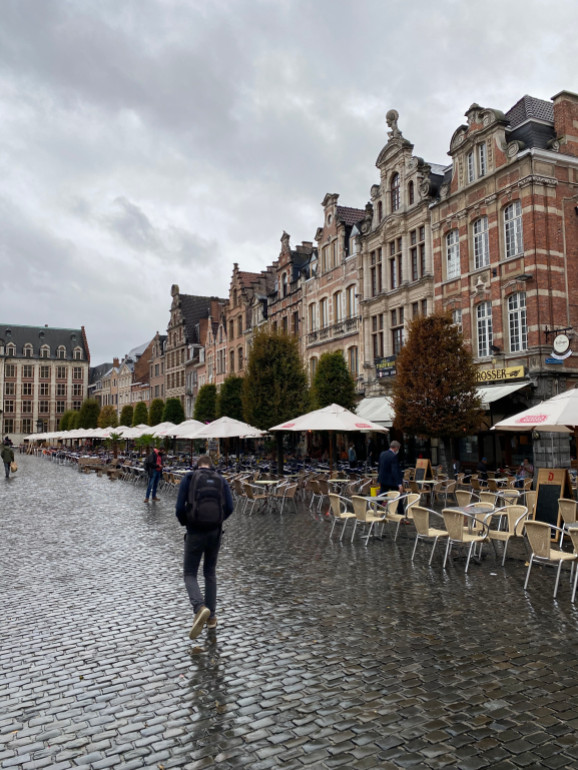
In non-coronavirus times, the historic centre of the student city of Leuven is a lively area with rows of bars [Annette Ekin/Al Jazeera]
Black students on campus say racism ranges from ignorance to microaggressions and straight-up aggression. There is misogynoir and racial slurs.
Professors also perpetuate racism. Félicia recalls a law professor saying they would take a student’s phone if they didn’t get off it and “send it to Africa where there were no phones” – and students laughing. Another student recalls a professor saying there could be more Black and brown students but that would mean lowering the university’s standards.
Sometimes, it is a feeling of never being welcome. Félicia has been one of a handful of Black students in a class while others defended the right to use racial slurs. She left the class feeling drained. She works as a receptionist to support her studies and says the environment has affected her motivation to study. “I feel like they indirectly push people away,” she says.
In October 2019, a student circle, Eoos, for students of Language and Area studies, threw a party with the theme “politically incorrect”. It was racist, sexist, anti-Semitic and homophobic, says Fouzia Sadala, 23, a biomedical sciences student. Students were invited to write statements to decorate a bar and came up with lines such as: “Congo was not a genocide because they are not people.” The head of the society initially passed it off as a joke. But after an outcry, the circle apologised.
Fouzia who is Bangladeshi and Rwandan says Karibu has given her a sense of belonging. In her first year, a white middle-aged woman on a bus verbally harassed her, saying she should “go back” and that “her parents should not be here”. She did not feel like she could speak to anyone at her faculty, and did not have any Black friends back then to confide in. As the first in her family to go to university, she did not want to worry her parents. “I kept it to myself,” she says.
On Sanda’s experience with racial abuse, she thinks he could have said something, but that it would not have changed a thing.
For her, getting a bit older and having Karibu has made her bolder. Fouzia, who is Muslim, has begun sometimes wearing a headwrap – where before she did not want to stand out. “I’m supposed to be here and I’m doing what I’m doing and nobody can stop me,” she says.
For Félicia, Sanda’s story shows how many Black students still do not have enough places to grow and go.
“That is why I feel like Karibu is very important because now we can connect Black lawyers or African engineers to those students, internship students that need a workplace,” she says.
“It makes me sad because I feel like we came a year too late for him.”
Thirty hours of community service
The details of what Sanda endured has deeply shaken students and professors at KU Leuven and many have been vocal in criticising the university. In early August 2020, in an open letter to the rector Luc Sels, professors expressed shock and called for greater disciplinary action including the suspension of former Reuzegom members still studying at the university.
“KU Leuven must also consider the possible sanctions it can still take with regard to those who have graduated in the meantime, at least one of which is said to be employed at our university,” the professors wrote.
The way KU Leuven has handled the case – and continues to – has left many baffled, angry and disappointed.
After Sanda’s death, the university’s vice rector sanctioned Reuzegom members with 30 hours of community service – roughly the duration of the fatal hazing – including working with children and writing a paper on the history of “baptism” rituals, enabling them to avoid suspension. The university’s response has been seen as weak. KU Leuven also come under fire from its former rector, Rik Torfs, for neglecting its “moral task” and not investigating possible racist motives.
In the Knack interview in late August, Mary, the lawyer, said Reuzegom members had until that point been “treated with velvet gloves” by the university.
Many believe Reuzegom members should have been suspended until a decision from the court or until more is known about what happened.
It looks like the university put no effort into understanding what happened, says Fouzia. “Parents lost their son. Friends lost their friend,” she says. “And the university just let them (Reuzegom members) finish their studies, do their exams, let them just live their lives.”
Nozizwe Dube, 24, a master’s law student at KU Leuven, believes the university failed Sanda’s family by not suspending the suspects.
Dube is a co-founder of Karibu and coordinator of student-led diversity platform UNDIVIDED, which champions minority voices at the university.
Dube says when the news stories came out, the university had a “classic PR response” – keeping quiet until the anger subsided.
“It’s easier for the university to keep quiet when it’s just about racism because racism is normalised at this point, not just in the university, but also in Flanders,” she says. But this time was different – the elitism also concerned white students from a working-class background, she says.
In late July, there was a short response from the university, saying it would await a court decision, and a few days later a letter from the rector defending the disciplinary action, pointing out it has no police authority and castigating criticism of the initial sanctions.
Dube and others believe if it were non-white or poorer students involved in the death of a student, they would have at least been suspended until a decision from the court.
In an open letter in early August, the rector urged forgiveness for the suspects.
This is gaslighting, says Dube. Before we can move forward we need to know the truth, she adds. “Black and brown students still feel unsafe, and Black and brown students still see that the university is taking practically zero efforts to make structural changes.”
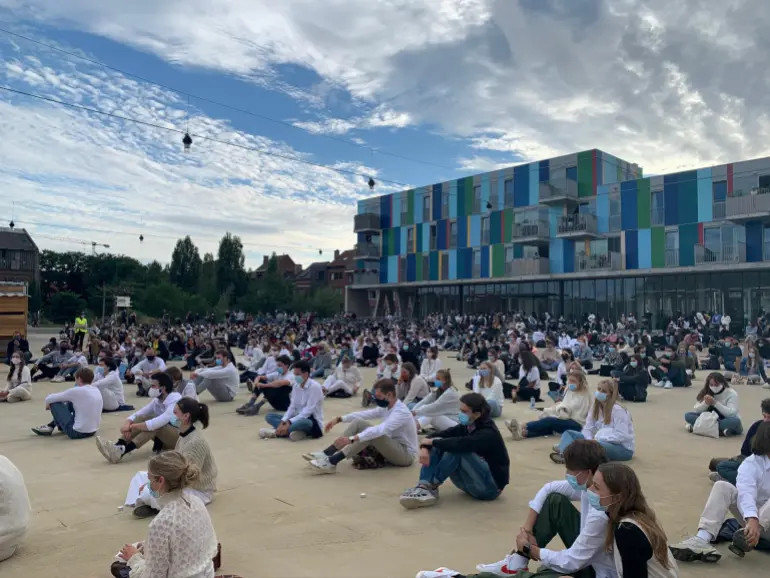
KU Leuven students gather for a student protest and silent vigil for Sanda Dia [Justine De Smet/UNDIVIDED]
When Karibu, UNDIVIDED and Sanda’s friends held a silent vigil on September 4 for Sanda, Dube says many felt anger and despair at the university’s motives.
On the same day, the university announced its decision to deny former Reuzegom members access to university buildings but to allow them to continue taking classes online – what students were mostly doing anyway with coronavirus measures – as long as they did not interact with other students. It said it had been granted access to the criminal file and had initiated a new disciplinary investigation.
Fouzia and others believe Sanda’s death shook many students out of their bubble and woke them up to real issues on campus – but not the institution.
In the words of Sonia Mutaganzwa, 21, who is of Rwandan descent, the university’s actions show: “KU Leuven doesn’t care about Black students.”
Many feel the university has only acted due to the pressure from public opinion. Claessens and Dube both want to see a stronger disciplinary policy that sanctions racism, sexism, homophobia, discrimination, and degradation of others by students and teaching staff.
Dube hopes the university will give Sanda’s family a proper response, perhaps with a change of policy and by acknowledging its shortcomings.
“KU Leven has done far from enough,” says Robrecht, who sees it as acting only because people demanded it to.
In a heart-rending interview with the newspaper De Morgen, Sanda’s father says he cannot understand why his son had to die – and for there to be a media frenzy – before the university said it would review its students’ hazing practices. “I had a lot of faith in KU Leuven. Wrongly. I sent my son there for a diploma. I got a body back.”
On January 4, 2021, De Morgen reported that KU Leuven had suspended seven former Reuzegom members involved in the hazing that killed Sanda. The university issued a statement saying it had launched “new disciplinary procedures against seven students”.
Sigrid Somers, press spokesperson at KU Leuven, told Al Jazeera the university continues to decline to provide comment due to the ongoing internal procedures and legal proceedings and could neither confirm nor deny the students’ suspension.
Why did they not save him?
Late on the evening of December 5, 2018, Robrecht was about to go to bed when he started getting messages showing screenshots of Reuzegom members on social media asking for the numbers of Sanda’s parents and saying that Sanda was at the University Hospital Antwerp in Edegem. He had been quickly transferred there from the first hospital he was taken to.
Robrecht did not have Sanda’s father’s number but knew where he lived. He drove there, picking up a friend along the way. They rang the doorbell and told Ousmane that Sanda was in hospital in Edegem. They did not know much more than that themselves.
He and the friend went ahead to the hospital while Ousmane got ready to go. At the hospital, there were about six Reuzegom members. “They didn’t speak one word,” Robrecht says. There was an adult with them. They looked pale, he remembers thinking afterwards. The doctors said it was not going well with Sanda.
The club members left before Sanda’s father arrived. The two friends wanted to stay, but Ousmane would not let them. “He said: No, ‘I would be less worried if I knew you were safely home.’ So we went home,” Robrecht recalls.
“We left, but we did not know he was dying.”
Sanda’s condition worsened. The next day, Robrecht and other friends met, clinging onto hope that Sanda, who was on life support, would pull through. The following day, while working on a gardening job, he received a message that Sanda had died. On the drive home, he says he could hardly see the road through his tears.
The news that his friend was going to be taken off life support left Ferre “broken”.
“I told my father I would never find a friend like him again,” he recalls in a shaky voice.
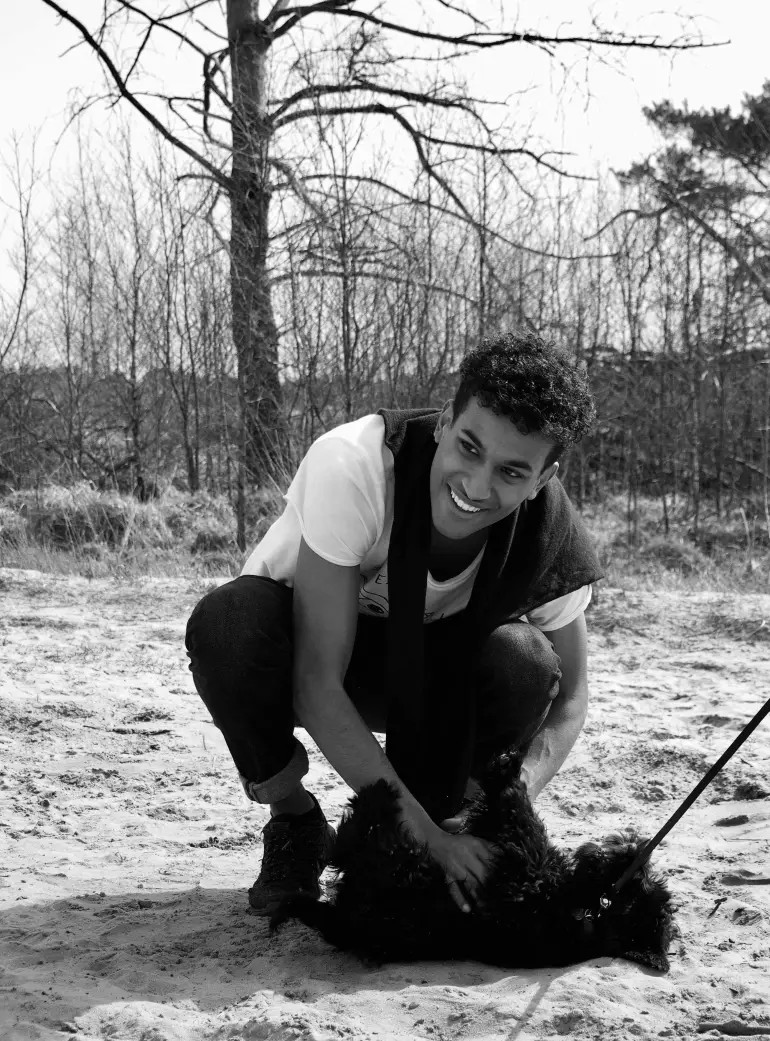
Two years after Sanda Dia died, his family and friends are still waiting for answers for what exactly happened at the hazing that killed him [Photo courtesy of Sanda Dia’s friends/sanda.dia on Instagram]
Ferre, Robrecht and other friends were in contact with Sanda’s family and arranged his funeral. A week later, Sanda’s friends carried his body into the basilica in Edegem where they had removed the crucifixes out of respect for Ousmane’s Islamic faith. Hundreds of people attended.
“We knew that a lot of people would come to his funeral and actually 700 seats was not enough,” says Robrecht.
Sanda’s body was then taken to the mosque, where his family performed funeral rites before he was buried.
Robrecht says he has been grieving the loss of his friend, but after learning more about the hazing he says: “I didn’t understand anything anymore.” He refers to the Dutch word onbegrip for how he feels. It means incomprehension but also expresses an emotion, which adds to a feeling of loss and anger, he says.
“He was a person that was worth saving and nobody felt that way,” he reflects.
He says he cannot understand how 18 adults could be so irresponsible that it could lead to Sanda’s death. “It’s actually a question I don’t know any answers to and I think I will be asking for the rest of my life.”
Sanda’s friends have been asking themselves if he was a victim of a racist crime. Someone white could have died too, believes Robrecht. But he wonders if racism within the group meant Sanda “needed to endure everything a little bit harder”.
He says they cannot understand why Reuzegom members did not save him or why they did not stop. “You have the power to always end it.”
Sanda’s death has brought his friends together with his father. Before the coronavirus pandemic, Robrecht, Ferre and others would visit Sanda’s father almost every month to watch football and eat the Senegalese dishes that he prepared. Ferre says Ousmane will FaceTime him to ask how things are going.
Robrecht believes Sanda’s father is going through one of the hardest periods of his life because of the attention his son’s story has received and learning about what he endured.
“Belgium has given me everything: a son, a future. Reuzegom has taken everything from me. My life has been destroyed,” Ousmane Dia told the news outlet De Morgen in an interview.
The public will be watching this case, according to Mary, one of his lawyers. In the majority of cases, the family members of victims want hard sentences, but Sanda’s family is different, he told Al Jazeera. “They just want the truth. And about what happened in this case, we don’t have the truth. They left Sanda for at least two hours in the grass dying.” And then on the same night with “surgical precision” they cleaned the crime scene and erased their WhatsApp communication.
At the public trial, questions about racism can be asked. “For the moment, I cannot say that we have a racial matter,” the lawyer explains. “But I cannot exclude it.”
Lawyers representing the 18 suspects either declined to comment, citing the ongoing investigation, or did not respond to a request for comment. Only one lawyer, Walter Damen, offered his view. He says the judge will decide when the investigation is complete and that it “shows that it is clear that there was never any racist motive, contrary to what some media have suggested”.
Sanda’s mother has not spoken publicly about her son’s death. She is “too hurt”, says Pepermans, her lawyer. “It is very difficult for her, hearing everything, being forced to think about what happened.”
She has started reading the case files, and will be present at the trial, Pepermans explains. “Clarity, we want to understand what happened. And justice,” she says of what Sanda’s mother wants.
Clarity may be a step in healing, says Pepermans.
Speaking about Sanda is painful, says Ferre, but remembering his friend also brings him happiness.
He cherishes his memories with Sanda. His home was always a second home. During the high school winter holidays Sanda would stay with Ferre and his family deep in the Black Forest, in southwest Germany. They would go for night walks and climb up the huge mounds of snow that the farmers cleared from the roads. Lying atop the snow, they would look at the stars, and talk about space and the future.
“I just hope that there would be justice for him or something that would line up with justice, that most people won’t think of him as just an accident,” Ferre says. “That it was really something we have to learn from: that it won’t happen again to someone; to be a little bit more loving to each other.”
Robrecht does not want his friend to be remembered by his tragic death. “I would like the world to know that he was much too good a person to die this way. And that he should have lived to have a very positive impact on the world.”
Reuzegommers lawyer about postponement of trial: “I abhor the idea of partiality that hangs around this dossier”.
John Maes and Joris Van Cauter, the lawyers of three Giant Pomars, hope that the trial about the student baptism of Sanda Dia will be continued as soon as possible. They said so in “De zevende dag”. They have the utmost confidence in the Antwerp Court of Appeal, which now has to look into the case. “These people are impartial, professional and do what they have to do,” says Maes, who is horrified by the idea of partiality in the dossier.
Last week, the Sanda Dia trial was halted at the request of his family’s lawyers. They mainly want certainty that the entire baptismal ritual can be judged and not just the facts on 5 December 2018 at the log cabin in Vorselaar. The student baptism had already started on 3 December in Leuven. But according to the judge, she could only judge the last fatal day of the baptism and not the whole course of the baptism. Sanda Dia’s family objected to this and as a result the trial has been put on hold for months.
“We were ready to plead, now it is abruptly interrupted. That is regrettable”, says the lawyer of 2 Giant Bombs, John Maes in “The Seventh Day”. Joris Van Cauter, lawyer of another Reuzegommer, also finds it regrettable that the trial is delayed. “It is an unfortunate state of affairs. When you start a trial, you want to see it through. You are so psychologically prepared for that. The momentum was there. We are three and a half years after the facts,” says Van Cauter. The two lawyers therefore hope that the trial will be continued soon.
According to Van Cauter, it is an unfortunate state of affairs that originated earlier in the proceedings. It goes back to the chambers where, according to him, there was no debate. “That is where the decision is made on which facts to bring before the court. And a negative aspect in this case is -I think- the pressure that exists from the media on the court. As a result, the moment in chambers was not well used,” Van Cauter said.
Antwerp versus Hasselt
The trial is now on hold until the Court of Appeal in Antwerp has decided whether the appeal by Sanda’s family is admissible and well-founded. Sven Mary, Sanda’s family lawyer, said last week that he feared the case would not return to the Hasselt court. “They will take the case to Antwerp, I am 99 percent convinced of that,” he said then.
But the whole process has just been taken out of Antwerp in the past because one of the Giant’s Judges is the son of an Antwerp magistrate. It was feared at the time that the case would be influenced and that a fair trial would not be able to take place in Antwerp. But according to Maes, the move was rather symbolic.
According to Maes, the fact that the Sanda Dia case is now back in Antwerp should not be a problem. “I don’t see why the Court of Appeal in Antwerp cannot judge impartially. Those people are impartial, professional and do what they have to do. I abhor the idea that there is an aura of partiality and danger of partiality surrounding this case. That is completely unjustified. I am confident that it will be very serene and impartial,” concludes Maes.
Advocaat Reuzegommers over uitstel proces: “Ik gruwel van idee van partijdigheid dat rond dit dossier hangt”
John Maes en Joris Van Cauter, de advocaten van drie Reuzegommers, hopen dat het proces over de studentendoop van Sanda Dia zo snel mogelijk wordt verdergezet. Dat hebben ze gezegd in “De zevende dag”. Ze hebben het volste vertrouwen in het Antwerpse hof van beroep dat zich nu over de zaak moet buigen. “Die mensen zijn onpartijdig, professioneel en doen wat ze moeten doen”, aldus Maes die gruwelt van het idee rond partijdigheid in het dossier.
Vorige week werd het proces Sanda Dia stilgelegd op vraag van de advocaten van zijn familie. Die willen vooral zekerheid dat het hele doopritueel kan worden beoordeeld en niet enkel de feiten op 5 december 2018 aan de blokhut in Vorselaar. De studentendoop was al op 3 december begonnen in Leuven. Maar volgens de rechter kon zij alleen oordelen over de laatste fatale dag van de doop en niet over het hele verloop van de doop. En daar ging de familie van Sanda Dia tegenin waardoor het proces nu voor maanden stilligt.
“Wij waren klaar om te pleiten, dat wordt nu abrupt afgebroken. Dat is spijtig”, vertelt advocaat van 2 Reuzegommers, John Maes in “De zevende dag”. Ook Joris Van Cauter, advocaat van een andere Reuzegommer vindt het jammer dat het proces vertraging oploopt. “Het is een ongelukkige gang van zaken. Als je een proces aanvangt, wil je de rit uitzitten. Je bent daar psychologisch zo op ingesteld. Het momentum was er. We zijn drie en een half jaar na de feiten”, aldus Van Cauter. De twee advocaten hopen dan ook dat het proces snel wordt verdergezet.
Volgens Van Cauter is het een ongelukkige gang van zaken die zijn oorsprong al eerder in de procedure vindt. Het gaat terug tot de raadkamer waar volgens hem geen debat is geweest. “Daar wordt er beslist welke feiten voor de rechtbank aanhangig worden gemaakt. En een negatief aspect in deze zaak is -denk ik- de druk die er bestaat vanuit de media op de rechtbank. Daardoor is dat het moment in de raadkamer niet goed benut geweest is”, aldus Van Cauter.
Antwerpen versus Hasselt
Het proces ligt nu stil tot het hof van beroep in Antwerpen geoordeeld heeft of het beroep van de familie van Sanda ontvankelijk en gegrond is. Sven Mary, advocaat van de familie van Sanda, zei vorige week nog dat hij vreesde dat de zaak niet meer naar de rechtbank van Hasselt zal terugkeren. “Ze zullen de zaak in Antwerpen naar zich toetrekken, ik ben daar voor 99 procent van overtuigd”, zei hij toen.
Maar het hele proces is in het verleden net uit Antwerpen gehaald omdat één van de Reuzegommers de zoon is van een Antwerpse magistrate. Men vreesde toen voor beïnvloeding en dat er zo in Antwerpen geen eerlijk proces kon plaatsvinden. Maar die verhuis was volgens Maes eerder symbolisch.
Dat de zaak Sanda Dia nu weer in Antwerpen ligt, mag volgens Maes geen probleem vormen. “Ik zie niet in waarom het hof van beroep in Antwerpen niet onpartijdig zal kunnen oordelen. Die mensen zijn onpartijdig, professioneel en doen wat ze moeten doen. Ik gruwel van het idee dat er een waas van partijdigheid en gevaar voor partijdigheid hangt rond dit dossier. Dat is volstrekt ten onrechte. Ik vertrouw erop dat het zeer sereen en onpartijdig zal verlopen”, besluit Maes.
Public Ministry also goes to the Court of Appeal
The public prosecutor’s office, like the lawyers of Sanda Dia’s family, is appealing to the Antwerp Court of Appeal. It is appealing against the ruling of the president of the Hasselt correctional court that the court was only competent to rule on the charges relating to the events of 5 December 2018 in Vorselaar.
The public prosecutor’s office starts the procedure at the appeal court for all defendants. The Court of Appeal must now clarify whether the Hasselt court has jurisdiction over all the facts, including the preparatory meeting and the events of 4 and 5 December 2018 in Leuven, which played a role in the hazing that got out of hand and in which Sanda Dia lost her life. It specifically concerns the facts committed from the waking of the shafts in Leuven until the departure to the log cabin in Vorselaar.
In a clarification, the public prosecutor already announced that it was of the opinion that the Hasselt judges were indeed competent to judge the events in Leuven.
On 29 April, the lawyers of Sanda Dia’s family stopped the trial in Hasselt to go to the Court of Appeal in Antwerp to clarify the powers of the Hasselt judge.
It is not yet clear when the Court of Appeal will hear the case.
Ook openbaar ministerie stapt naar hof van beroep
Het openbaar ministerie stapt net als de advocaten van de familie van Sanda Dia naar het hof van beroep van Antwerpen. Het tekent beroep aan tegen de uitspraak van de voorzitter van de Hasseltse correctionele rechtbank dat de rechtbank enkel gevat was om te oordelen over de tenlasteleggingen die sloegen op de feiten van 5 december 2018 in Vorselaar.
Het parket start de procedure bij het hof van beroep voor alle beklaagden. Het hof van beroep moet nu uitklaren of de Hasseltse rechtbank bevoegd is voor alle feiten, waaronder de voorbereidende vergadering en de gebeurtenissen van 4 en 5 december 2018 in Leuven, die een rol hebben gespeeld bij de uit de hand gelopen doop waarbij Sanda Dia het leven liet. Het gaat specifiek over de feiten die gepleegd werden vanaf het wekken van de schachten in Leuven tot aan het vertrek naar de blokhut in Vorselaar.
Bij een verduidelijking liet het openbaar ministerie reeds weten dat het van mening was dat de Hasseltse rechters wel degelijk bevoegd zijn om te oordelen over de gebeurtenissen in Leuven.
Op 29 april legden de advocaten van de familie van Sanda Dia de rechtszaak in Hasselt stil om naar het hof van beroep in Antwerpen te trekken om op die manier klaarheid te scheppen over de bevoegdheden van de Hasseltse rechter.
Het is nog niet duidelijk wanneer het hof van beroep de zaak zal behandelen.
Sanda Dia, un baptême qui vire au cauchemar – Sevtenparle
21 feb. 2021
Das Ritual: Der schreckliche Fall des Sanda Dia | Doku
Dog Fetches Back Smelly Surprise
8 aug. 2013